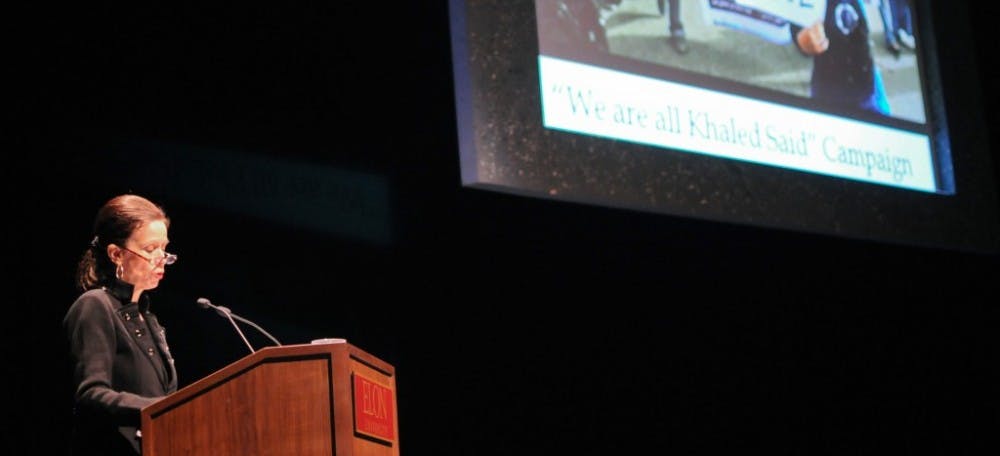Applause thundered in McCrary Theater Feb. 23 as correspondent and foreign analyst Robin Wright delivered a discourse on the continued relevancy of the Arab Spring and the forces that drive the ongoing transformation of the Middle East.
“The most important series of events in the early 21st century are the epic convulsions across the Islamic world,” Wright said. “The new uprisings are redefining who is in power. The days of the elites, many of whom were America’s allies, are over. This is a whole new crowd.”
Wright attributed the eruption of uprisings in the Middle East to simple numbers — roughly two-thirds of the region’s 300 million people are under the age of 30. The younger generation is largely literate, an advantage not widely afforded to older generations. It is the literate majority that facilitates the flow of ideas spurring the region’s restlessness, which is eased by social media and digital communication.
“People have found a voice,” Wright said. “They are willing to use it bluntly through old media as well as new.”
With that voice, dissatisfaction is proclaimed. Frustration is broadcast. Change is demanded. And then, voice is translated into action, Wright said.
“The overwhelming attempt to bring about change in the world’s most volatile region is through peaceful civil disobedience, even when (citizens) face being fired on with live ammunition,” Wright said.
The former leaders of Tunisia, Egypt, Libya and Yemen have been effectively ousted by the sweeping revolution, which has left in its wake a sea of change.
“All 22 countries in the Arab world will be changed significantly by the rage and rebellion across the region,” Wright said. “All 22 leaders will have their power changed in significant ways, even in countries where they manage to retain power, at least for now.”
But the rebellions have given way to more than just political upheaval. The revolutionists now challenge longstanding social and cultural norms and redefine what it means to be Muslim.
Wright cited stories of women who feminized the hijab, protested the practice of female genital mutilation, lobbied for the right to show independent films and campaigned for political office. She spoke of men who dared to criticize the government through rap music in a region where the genre is widely outlawed. She showed photos of a new wave of political satirists and social commentators that see humor as a means to an end.
But despite its apparent advances, the Middle East is to face a “wild and worrisome decade,” Wright said.
Political parties, both secular and Islamic, are competing to fill power vacuums left by the ousting of former presidents. Countries such as Syria are still in the midst of an uprising —about 9,000 Syrian citizens have died in violence enacted by the government, according to CNN.
Political instability compounded with economic uncertainty will dominate much of the foreseeable future, Wright said.
“The big question is whether these old autocracies will become new democracies or new theocracies,” Wright said. “For the people in the region and for us, the next decade will be a time of unprecedented transformation and greater turbulence than the last decade.”
But there is hope. In a recent conversation with a young female activist in Egypt, Wright asked if she was worried about the future.
“She said, ‘I’m concerned because we don’t have the resources. We don’t know enough about democracy, and we don’t have the institutions or the time to build them,’” Wright said. “’But I’m not worried,’ she said, ‘because I now have power, and if this ever happens again, I know how to challenge it.’”
Wright began covering conflict in the Middle East in 1973 at the start of the fourth Arab-Israeli War. Her subsequent coverage of wars and revolutions in the Middle Eastern and African regions has won immense critical acclaim and seven journalistic awards, as well as fellowships with a multitude of elite institutions. She has reported for more than 10 major newspapers and magazines and authored seven books, most recently “Rock the Casbah: Rage and Rebellion Across the Islamic World.”


